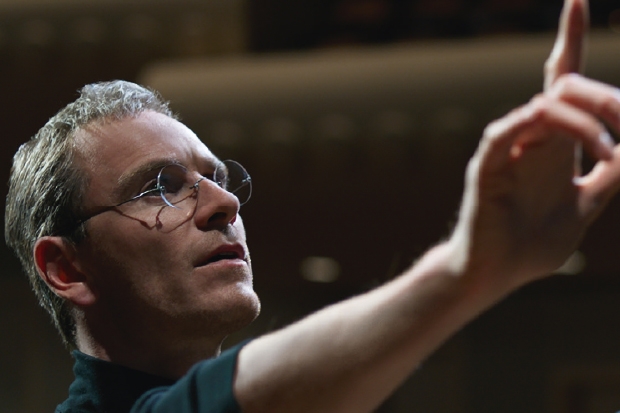Steve Jobs is a film about a man in whom I have little interest, but for 120 minutes I was at least quite interested, which is a result. But this doesn’t make it a great film, and in many ways it isn’t. It never quite pins Jobs down. It never quite works out what it wishes to say about him. That he was such a ‘genius’ it didn’t matter if he was also a bit of a dick? Or that it did matter, totally? Plus, the ending is calamitous. But it is well made, and the performances are ace, as is the dialogue, and I was kept interested, so the journey may well be worthwhile, even if the destination is not.
Directed by Danny Boyle, this is from a script by Aaron Sorkin who, among much else (The West Wing, Moneyball, Charlie Wilson’s War), also wrote The Social Network about Facebook’s Mark Zuckerberg, with whom Jobs (who was CEO of Apple until his death — my mother wouldn’t know!) seems to have had much in common, if the two films are to be believed. Principally, both perfectly comprehended how people might wish to communicate, without having the faintest idea how to communicate themselves. How do you feel, the mother of Jobs’s child asks him at one point, about me and our daughter being on welfare, when Time says your stock is valued at $410 million? ‘The stock,’ he replies, not with deliberate cruelness, but because it’s his world-view, ‘is undervalued.’ He had previously denied his daughter’s paternity, even after a DNA test had proved he was the father. Not a touchy-feely man, in other words, and one with absolutely no care for the feelings of others, but as played by Michael Fassbender, who is riveting, you understand that he doesn’t understand what he’s not understanding. ‘I am poorly made,’ he even confesses, in a rare moment of self-awareness.
Travelling from the early Eighties to the late Nineties, this is a biopic deconstructed into three 40-minute acts that happen in real time backstage prior to the launches of the Apple Macintosh, the NeXTcube (his doomed computer for schools) and the iMac. The fact that Jobs is due on stage offers a narrative urgency, while the quick snap of Boyle’s direction — the camera is on the move all the time, but not to exhausting, Birdman levels — ensures that although this is a film in which nothing happens apart from people talking to one another (it’s a ‘non-action’ film, if you like) it never feels stodgy or inert.
The story is told through his key relationships, most notably with his head of marketing and ‘work wife’ Joanna Hoffman (Kate Winslet, with a coming-and-going East European accent), who appears joined to him at the hip and who spends less time on marketing than on undoing the personal harm Jobs might have done in relation to other key figures. Must I list them? I suppose I must, as they do keep turning up. So there’s his Apple co-founder Steve Wozniak (Seth Rogen), programmer Andy Hertzfeld (Michael Stuhlbarg), one-time Apple CEO John Sculley (a delicious Jeff Daniels), the mother of Jobs’s daughter Chrisann (Katherine Waterston) and that daughter, Lisa, who is played by various actresses at various ages. The dialogue between them is pure Sorkin, in that it is marvellously clever, and cracks with the velocity of a screwball comedy, but I won’t give any examples of any of the lines here, because you do need to hear them delivered. ‘I sat in a garage and invented the future,’ says Jobs, and now I have given you an example, while proving why I shouldn’t have. Sounds nothing on the page.
I’ve no idea what’s true here, or what isn’t, what’s been conflated, what’s been omitted, but I would hope to come away with a proper sense of the man, and this is where the film trips up.
Beyond those rare moments of self-awareness, which, I have to say, felt rather contrived, Jobs’s inner life is nowhere, and as for the ‘genius’, where is that? ‘Musicians play their instruments. I play the orchestra,’ he says of himself. But we never see him playing that orchestra; only ever see him as a driven perfectionist shouting at people. It also fails to deliver on what I call the ‘great cook, terrible human being’ problem, which is what Marcus Wareing said of Gordon Ramsay, and while I’m not comparing Ramsay to Jobs — Ramsay has not changed how we all live our lives, as far as I’m aware —it does raise the knotty issue of personality and its entanglement with talent. ‘You can be gifted and decent,’ Wozniak tells Jobs, but could Jobs have been? The filmmakers take no view on this, which leaves us all somewhat up in the air. And as for the ending, which wants to be redemptive, but merely comes over as syrupy and sentimental, it is so beneath all involved I never wish to think of it again. The journey, not the destination. It’s only worth it for that.






Comments